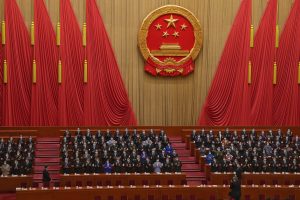As always, China’s “Two Sessions” – the annual meetings of the National People’s Congress (NPC) and the Chinese People’s Political Consultative Conference (CPPCC) – convened in Beijing in early March. This year’s NPC session was particularly notable for finishing up the leadership transition that began with last year’s National Party Congress: The Chinese Communist Party (CCP) posts were filled in October 2022, but the state positions (including president, premier, and vice president) had to wait until March 2023.
While Chinese state media make a point of promoting the Two Sessions each year, the reaction from abroad is largely bemused. The NPC, in particular, is often dismissed as a meaningless “rubber-stamp legislature” with little real power. Most of the international focus is on the declarations made by other actors (including the premier) in press conferences and work reports, rather than the workings of the NPC itself.
To better understand the NPC and its role in China’s politics in the Xi era, The Diplomat’s Shannon Tiezzi spokes to Changhao Wei, an associate research scholar in law and a fellow at Yale Law School’s Paul Tsai China Center. Wei, who also founded and manages the NPC Observer website, explains that “the full NPC’s failure to ever vote down any bill, work report, or nomination” – its “rubber-stamp” reputation – does not negate “the importance of its delegates’ meaningful representation of citizen interests on a range of nonsensitive issues” or “the more active and stronger roles” of other NPC bodies.
The National People’s Congress is often described in media shorthand as “China’s rubber-stamp legislature.” What happens at the NPC’s annual session each year?
The NPC’s annual sessions serve three key purposes. They, first of all, function as the occasion for the NPC to exercise its legal prerogatives as the “highest organ of state power.” Each year, it reviews the central government’s annual budget and plan for China’s social and economic development, and also hears the work reports of its Standing Committee, the State Council, and top judicial authorities. The NPC has also been reviewing important legislation annually since 2015.
What attracts global attention to NPC sessions, however, is not so much the NPC’s authority per se as the platform it offers other state institutions. Through the documents they submit to the NPC, those institutions publicly report on their past year’s work and announce their goals and priorities for the coming year. NPC sessions also used to be the only time of the year when the public could hear directly from an array of high-ranking government officials (the number of press conferences has declined sharply since the pandemic began, however).
Finally, NPC sessions give thousands of delegates an annual window to propose legislation and policy measures. The full NPC’s failure to ever vote down any bill, work report, or nomination belies the importance of its delegates’ meaningful representation of citizen interests on a range of nonsensitive issues. Nor does it reflect the more active and stronger roles its Standing Committee and other subordinate bodies play in China’s political system.













